翻译课Week 2
(WEEK2)纽马克翻译理论

• 著名的翻译家和翻译理论家 • 从事过多种欧洲语言的翻译工作,是一位出色的 译者和编辑 • 同时是一位语言学家,并担任英国语言学家协会 会长 • 英国萨里大学(University of Surrey)的教授
• 他的主要兴趣就是把语言学的相关理论应用于翻 译实践之中,把翻译研究和英语语言研究相结合
• Faithful translation • A faithful translation attempts to reproduce the precise contextual meaning of the original within the constraints of the TL grammatical structures.
• 语义翻译中 ,译者应在译语语义和句法结 构允许的条件下,尽可能准确地再现原作上 下文的意义。 • 交际翻译中,译作所产生的效果应力求接近 原作,力图传译出原文确切的上下文意义,使 译文不论是在内容上还是在语言形式上都 能为读者所接受。
语义翻译与交际翻译的区别
1、从理论上讲,两者有很大的差异
Communicative translation(交际翻译) attempts to produce on its readers an effect as close as possible to that obtained on the readers of the original. (努力使译文对目的语读者所产生的效果与原文对源语读 者所产生的效果相同。) 交际翻译的重点是根据目的语的语言、文化和语用方式传 递信息,而不是尽量忠实地复制原文的文字。译者在交际 翻译中有较大的自由度去解释原文,调整文体、排除歧义 ,甚至是修正原作者的错误。由于译者要达到某一交际目 的,有了特定的目的读者群,因此他所生产的译文必然会 打破原文的局限。 通常采用交际翻译的文体类型包括新闻报导、教科书、公 共告示和其他很多非文学作品。
六年级英语课文comments翻译

六年级英语课文comments翻译Unit 1 Lesson 1-C Let’s read.英语课文翻译Bill is going to Canada and is going to stay there for five months.He is going to stay at Ted' s house.Ted lives with his parents and his sister Tina.Billis also going to go to Ted' s school.He is very excited.比尔打算去加拿大并且打算在那里待五个月。
他打算待在特德的家里。
特德和他父母以及他妹妹蒂娜居住在一起。
比尔也打算去特德的学校。
他非常兴奋。
Bill also feels quite sad.He will miss his teachers and friends.He has a going away party at school.He says goodbye to everyone.Bill' s friends say they will email him every week.比尔也感觉很难过。
他将想念他的老师们和朋友们。
他在学校举办一个欢送会。
他与每个人告别。
比尔的朋友们说他们将每周给他发电子邮件。
It is very cold and snowy in Canada in the winter.Bill takes some sweaters,scarves and a warm coat.He' s going to be in Canada in the spring and summer too,so he also takes T-shirts and shorts.Bill will miss his father and mother,so he takes a photo of his family.加拿大的冬天非常冷而且多雪。
人教版小学英语PEP五年级上册英译汉课文翻译(三起点)

Unit 1 What's he like?This is Amy. She's quiet. She's very hard-working.这是埃米。
她很文静。
她非常勤劳。
That is Wu Yifan. He's very clever. He's polite, too.那是吴一凡。
他非常聪明。
他也很有礼貌。
Hello.My name is Oliver.你好。
我叫奥利弗Hi.Hello.你好。
你好。
What's he like?We have a new PE teacher. He's a good football player.Cool! 我们有一位新体育老师。
他是一名很棒的足球运动员。
太酷了!Ms Wang will be our new Chinese teacher.王老师将要成为我们的新语文老师。
What's she like? She's very kind.Is she strict?Yes, sometimes. 她怎么样?她非常和蔼。
她严厉吗?是的,有时候。
Unit1 A-Let's try英语课文翻译Wu Yifan: Look! That’s Mr Li, our maths teacher!吴一凡:看!那是李老师,我们的数学老师!Oliver: He’s so strong.奥利弗:他真强壮。
Wu Yifan: Yes. He’s a good basketball player.吴一凡:是的。
他是一位好的篮球运动员。
Oliver: Cool! Is he strict?奥利弗:太酷了!他严厉吗?Wu Yifan: Yes, sometimes.吴一凡:是的,有时候。
Wu Yifan: Do you know Mr Young?吴一凡:你知道扬老师吗?Oliver: No, I don’t. Who is he?奥利弗:不,我不知道。
新版八年级上册英语课文翻译

2018年新版八年级上册1-10单元课文+翻译英语Goforit八年级上册1-10单元课文+翻译Unit1Wheredidyougoonvacation----------------------------------P2你去哪儿度假了Unit2Howoftendoyouexercise--------------------------------------P4你多久锻炼一次Unit3I’mmoreoutgoingthanmysister.-----------------------------P6我比我的姐妹外向;Unit4What’sthebestmovietheater----------------------------------P8最好的电影院是哪家Unit5Doyouwanttowatchagameshow--------------------------P10你想看个游戏节目吗Unit6I'mgoingtostudycomputerscience.-------------------------P12我打算学习计算机科学;Unit7Willpeoplehaverobots----------------------------------------P1 4人们将会有机器人吗Unit8Howdoyoumakeabananamilkshake--------------------P16你怎样制作香蕉奶昔Unit9Canyoucometomyparty------------------------------------P18你能来我的聚会吗Unit10Ifyougototheparty,you’llhaveagreattime-------------P20如果你去参加聚会的话,你将会玩得非常高兴Unit1Wheredidyougoonvacation你去哪儿度假了SectionA—1bP1Conversation1对话1XiangHua:Hey,Tina.Wheredidyougoonvacation嘿,蒂娜;你去哪儿度假了Tina:Iwenttothemountainswithmyfamily.我和家人去爬山了; XiangHua:Dideveryonehaveagoodtime大家都玩得开心吗Tina:Oh,yes.Everythingwasexcellent.Wheredidyougo,XiangHu a哦,是的;一切都很棒;你去哪儿了,项华XiangHua:IwenttoNewYorkCity.我去了纽约市;Conversation2对话2Girl:Wheredidyougoonvacation,Sally莎莉,你去哪儿度假了Sally:Nothing.Ijuststayedathome.没有,我只是呆在家里; Girl:Anddidyoudoanythinginteresting,Bob你做了什么有趣的事吗,鲍勃Bob:Yes,Ivisitedmyuncle.Wewentfishing,butwedidn’tgetanyfish.是的,我看望了我叔叔;我们去钓鱼了,但是没钓到鱼;Conversation3对话3Boy:Didyougoanywhereonvacation,Tom汤姆,假期你去了什么地方吗Tom:Iwenttosummercamp.我去了夏令营;Boy:Didyougowithanyone你和别人去的吗Tom:Yes,Iwentwithmyfriends.Everyonehadagreattime.是的,我和朋友们一起去的;大家都过得很高兴;2a&2bP2Conversation1Boy:Wheredidyougoonvacation,Grace格蕾丝,你去哪儿度假了Grace:IwenttoNewYorkCity.我去了纽约市;Boy:Oh,reallyDidyougowithanyone啊,真的吗你和别人去的吧Grace:Yes.Iwentwithmymother.是的,我和我母亲一起去的; Boy:DidyougotoCentralPark啊,真的吗你去了中央公园没Grace:Yes,Idid.Itwasreallynice.是的,我去了;那真的不错; Boy:Didyoubuyanythingspecial你买了什么特别的东西吗Grace:Yes.Iboughtsomethingformyfather.是的,我给我父亲买了点东西;Boy:Oh,reallyWhat哦,真的吗是什么Grace:Iboughthimahat.我为他买了顶帽子;Conversation2Girl:Wheredidyougoonvacation,Kevin凯文,你去哪儿度假了Kevin:Iwenttothebeach.我去了海滩;Girl:Oh,that'snice.Didyouplayvolleyball哦,那倒不错;你打排球了没Kevin:No,Ididn't.不,我没打;Girl:Well,didyouswim那么,你游泳了吗Kevin:Yes,Idid.Thewaterwasreallywarm.是的,我游了;水真的很暖;Girl:Howwasthefood食物怎么样Kevin:Everythingtastedreallygood每样东西都很好吃Girl:Didyoumeetanyoneinteresting你有没有遇到有趣的人Kevin:Yes.Imetsomeveryinterestingpeople.是的,我遇到了一些非常有趣的人;Conversation3Boy:Wheredidyougoonyourvacation,Julie朱莉,你去哪儿度假了Julie:Istayedathome.我一直呆在家里;Boy:Oh.Sodidyoudoanythinginteresting哦,那你有没有做什么有趣的事Julie:No,Ididn't.不,我没有;Boy:Didyoustudyforyourtests你有没有为测验而学习呢Julie:Yes,Idid.是的,我有;Boy:Didyougooutwithanyone你有没有和谁出去呢Julie:No.Noonewashere.Everyonewasonvacation.不,没人在这里;所有人都在度假;2dRick:Hi,Helen.Longtimenosee.嗨,海伦;好久不见;Helen:Hi,Rick.Yes,Iwasonvacationlastmonth.嗨,里克;是的,我上个月去度假了;Rick:Oh,didyougoanywhereinteresting哦你去了有趣的地方吗Helen:Yes,IwenttoGuizhouwithmyfamily.是的,我和家人一起去了贵州;Unit2Howoftendoyouexercise你多久锻炼一次SectionA—1bP9Reporter:Whatdoyouusuallydoonweekends你周末通常做什么Girl1:Isometimesgoshopping.我有时去购物;Boy1:Inevergoshopping.IusuallywatchTV.我从不购物;我通常看电视;Boy2:Ialwaysexercise.我总是做运动;Girl2:Ioftenhelpwithhousework.我经常帮忙做家务; Reporter:Howaboutyou你呢Girl3:IhardlyeverwatchTV.Ialwaysread.我几乎不看电视,我总是看书;Reporter:Oh,whyisthat哦,为什么呢Girl3:Oh,Idon’tknow.IguessIjustlikebooks.哦,不知道;我猜我只是喜欢书;2a&2bP10Reporter:So,ChengTao,howoftendoyouwatchTV那么,程涛,你多久看一次电视ChengTao:Hmm…abouttwiceaweek,Iguess.嗯……我想大约一周两次吧;Reporter:Uh-huh.Andhowoftendoyouread嗯哼,那你多久读一次书ChengTao:Oh,Ireadeverydayatschool哦,我每天都在学校读书Reporter:Howoftendoyougotothemovies你多久看一次电影Chen:Uh…let'ssee…maybeonceamonth 嗯……让我想想……大概一个月一次;Reporter:Howoftendoyouexercise你多久锻炼一次ChengTao:Oh,Iexerciseaboutthreetimesaweek.哦,我一周大约锻炼三次;Reporter:Howoftendoyoushop你多久购物一次ChengTao:Shop Ishopabout…abouttwiceamonth.购物我大概……一个月购物两次;2dJack:Hi,Claire,areyoufreenextweek嗨,克莱尔,你下周有空吗Claire:Hmm…nextweekisquitefullforme,Jack.嗯……我下周都安排满了,杰克;Jack:ReallyHowcome真的吗怎么会呢Claire:Ihavedanceandpianolessons.我得上舞蹈课和钢琴课; Jack:Whatkindofdanceareyoulearning你在学什么种类的舞蹈2bP13WhatDoNo.5HighSchoolDoinTheirFreeTime起锻炼时,你可以陪着朋友家人;请记住,“旧习难改”,因此趁着时机还不晚,赶快开始锻炼吧Unit3I’mmoreoutgoingthanmysister.我比我的姐妹外向; SectionA—1bP17Conversation1Boy1:IsthatSamplayingtheguitar是萨姆在弹吉他吗Girl:No,that’sTom.SamhaslongerhairthanTom.不,那是汤姆;萨姆的头发比汤姆的长;Boy2:BothTomandSamcanplaythedrums,butSamplaysthembettert hanTom.汤姆和萨姆都会打鼓,但萨姆比汤姆打得好; Conversation2Boy:That’sTara,isn’t那是塔拉,不是吗Girl:No,itisn’t.It’sTina.TinaistallerthanTara.Andshealsosingsmoreloudlythan Tara.不,不是;是蒂娜;蒂娜比塔拉高,而且她还唱得比塔拉大声; Conversation3Boy:IsthatPaul那时保罗吗Girl:No,that’sPeter.Peter’sheavierthanPaul.AndPaul’sshorterthanPeter.不,那是彼得;彼得比保罗胖,而保罗比彼得矮;2a&2bP18Interviewer:Tina,doyouthinkyouaredifferentfromyoursister Tara蒂娜,你认为你和你的姐妹塔拉不同吗Tina:Oh,sure.Welooksimilarbutwe’reverydifferent.哦,当然;我们看起来像,但非常不同;Interviewer:ReallyInwhatwaysareyoudifferent真的吗你们什么方面不同Tina:Well,I’mmoreoutgoingthanTara.I’mfriendlierandfunnier,too.AndIlovesports.好的,我比塔拉更外向,我还更友善、更有趣,而且我热爱运动;Tara:Yes,shecanrunfasterandjumperhigherthanme.是的,她能比我跑得更快、跳得更高;Interviewer:Who’smorehard-workingatschool谁在学校更勤奋Tara:Tinathinkssheworksharderthanme,butIworkashardasTina .Butshe’ssmarterthanme.蒂娜认为她比我更努力,但我和她一样努力;不过她比我聪明;Tina:Notreally.IthinkI’mlazierthanTara.Shealwaysgetsupearlierthanme.不是真的;我认为我比塔拉懒;她总是比我早起;2dUnit4What’sthebestmovietheater最好的电影院是哪家SectionA—1bP25Conversation1Jack:Hi,Anna.Doyouwanttogotothemovies嗨,安娜,你想去看电影吗Anna:Hi,Jack.Yes,let’sseeamovie.嗨,杰克;是的,咱们去看电影吧;Jack:What’sthebestmovietheatertogoto去哪家电影院最好Anna:TownCinema.It’stheclosesttohome.城镇电影院;它离家最近;Jack:Yes,butwhataboutthelongwaitingtimetogetmovietickets 是的,但是为了拿到电影票所等待的漫长时间又怎么办呢Anna:Don’tworry.Therearealotofpeopleworkingthere.Youcanbuytickets themostquicklyatTownCinema.别担心;有许多人在那儿工作;在城镇电影院你可以最快地买到票;Conversation2Ken:Hi,Julie.嘿,朱莉;Julie:Hi,Ken.Howareyou嘿,肯;你好吗Ken:Good,thanks.Doyouwanttowatchamovie挺好的,谢谢;你想看电影吗Julie:Sure.当然;Ken:Isthereagoodmovietheaternearhere这附近有好的电影院吗Julie:Yes,ScreenCity.It’sthemostpopularonenearhereandithasthebestsound.有,大荧幕影视城;它是这附近最受欢迎的而且它有最佳的音效;Ken:Soundsgood.Let’sgo.听起来不错;我们走吧; Conversation3Barry:Hi,Jill.Doyouwanttoseeamovie嗨,吉尔;你想看电影吗Jill:Hi,Barry.Yes,agreatidea.嗨,巴里;是的,好主意;Barry:Doyouknowagoodmovietheater你知道好的电影院吗Jill:Yes,there’sonenotfarfromhere.是的,离这儿不远有一个; Barry:What’sitcalled叫什么名字Jill:It’scalledMovieWorld.Ithasthebiggestscreensandthemostcomfor tableseats.叫电影世界;它有最大的银幕和最舒适的座位;2a&2bP26Unit5Doyouwanttowatchagameshow你想看个游戏节目吗SectionA—1bP33Mark:Hey,Jack,IplantowatchTVtonight.Doyouwanttojoinme嘿,杰克,我今晚打算看电视;你想和我一起吗Jack:Sure.Whatdoyouwanttowatch当然;你想看什么Mark:Well,whatdoyouthinkoftalkshows嗯,你认为访谈节目怎么样Jack:Idon’tmindthem,butsometimestheycanbeabitboring.我不介意它们,不过有时候它们可能有点无聊;Mark:That’strue.Doyouwanttojustwatchthenews那倒是真的;你想要只是看看新闻吗Jack:Iguessso.Maybewecanwatchthatnewtalentshowafterthene ws.Iusuallycan’tstandtalentshows,butthatoneisquitefunny.我想是吧;也许我们可以看看新闻之后那个新的才艺节目;通常我无法忍受才艺节目,但是那个相当有趣;Mark:OK,sure,butthesoccergamestartsat5:00p.m.好吧,当然,但是足球比赛下午5点开始;Jack:Oh,yeah,Iwanttowatchthatgame,too.哦,是的,我也想看那场比赛;2a&2bP34Sally:Hi,LinHui.Whatareyouwatching嗨,林辉你在看什么LinHui:Hey,Sally.I’mwatchingareallyfunnysitcom.嘿,萨莉;我在看一部确实很有趣的情景喜剧;Sally:Oh,Idon’tlikesitcoms.WhatcanyouexpecttolearnfromthemIliketowatch thenewsortalkshows.哦,我不喜欢情景喜剧;你能期望从它们中学到什么我喜欢新闻或者访谈节目;LinHui:WatchingsitcomsisagreatwaytorelaxYoucanlearnsomeg reatjokes,too.看情景喜剧是种很棒的放松方式你还能学到些不错的笑话;Sally:Well,Ilikeshowsthataremoreeducational.Ithinkevenga meshowsarebetterthansitcoms.Youcantrytoguesstheanswersto thequestions.嗯,我喜欢更有教育意义的节目;我认为甚至是游戏节目都比情景喜剧更好;你可以尽力去猜那些问题的答案; LinHui:Thenwhatdoyouthinkofsoapoperas那么你认为肥皂剧怎么样Sally:Oh,umm,well,Iknowyoucan’texpecttolearnmuchfromsoapoperas,butIhavetosayIlovewatch ingthemIplantowatchDaysofOurPasttonight.哦,嗯,好吧,我知道你不能指望从肥皂剧中学到很多,但是我得说我爱看它们今晚我打算看我们过去的日子;2dUnit6I'mgoingtostudycomputerscience.我打算学习计算机科学;SectionA—1bP41Conversation1Boy:Tina,whatdoyouwanttobewhenyougrowup蒂娜,你长大后想做什么Tina:Hmm,IthinkIwanttobeacomputerprogrammer.嗯,我认为我想当一位编程人员;Boy:WowSoundsdifficult.Howareyougoingtodothat哇听起来很难;你打算怎样做到呢Tina:I’mgoingtostudycomputerscience.我打算学习计算机科学;Conversation2Girl:Larry,whatdoyouwanttobewhenyougrowup拉里,你长大后想做什么Larry:Ilovebasketball,soIwanttobeabasketballplayer.我热爱篮球,所以我打算当一名篮球运动员;Girl:Howareyougoingtodothat你打算怎么去做Larry:I’mgoingtopracticebasketballeveryday.我打算每天练习篮球;Conversation3Boy:Whatdoyouwanttobewhenyougrowup你长大后想做什么Girl:Iwanttobeanengineer.我成为一名工程师;Boy:Isee…buthowareyougoingtodothat 我知道了……但你打算怎么去做Girl:I’mgoingtostudymathreallyhard.我打算真正努力地学习数学;Conversation4Tina:Whatdoyouwanttobewhenyougrowup你长大后想做什么Boy:IwanttobeanactorbecauseIwantajobthat’sfun.我想成为一名演员,因为我想要一份有趣的工作;Tina:CoolHowareyougoingtodothat真酷你打算怎么去做呢Boy:I’mgoingtotakeactinglessons.我打算上表演课;2a&2bP42Girl:Whatdoyouwanttobewhenyougrowup,ChengHan程寒,你长大后想做什么ChengHan:Iwanttobeateacher.我想成为一名教师;Unit7Willpeoplehaverobots人们将会有机器人吗SectionA—1bP49Boy1:Doyouthinkpeoplewillhaverobotsintheirhomesin100year s你认为100年后人们的家里会有机器人吗Boy2:Yes,Ido.IsawarobotonTV,anditcleanedthekitchen.是的,我认为会;我在电视上见过机器人,它能打扫厨房;Boy1:Well,Idon’tthinkpeoplewillusemoney.我认为人们不会再用钱;Boy2:Doyouthinkeverythingwillbefree你认为每样东西都会免费吗Boy1:Yeah,probably.是的,很可能;Boy2:Ithinktherewillbeonlyonecountry.我认为将会只有一个国家;Boy1:OnlyonecountryintheworldWilltherebeworldpeace全世界只有一个国家吗未来会和平吗Boy2:Ihopeso.我希望如此;Boy1:Ithinkkidswon’tgotoschool.They’llstudyathomeoncomputers.我认为孩子们不再去学校;他们将在家通过电脑学习;Boy2:Oh,Idisagree.哦,我不同意;Boy1:Youdo你不同意Boy2:Yeah,therewillalwaysbeschools.是的,学校一直会有的; 2a&2bP50Ms.Steen:OK,nowIwanttoheareveryone’spredictionsaboutthefuture.好的,现在我想听一下大家对未来的预测;Girl1:Well,Ithinktherewillbemorepeople.我认为将会更多的人口;Ms.Steen:MorepeopleOK.Whatelse更多人口好的,其他同学Boy1:Ithinkthattherewillbelessfreetime.我认为空闲的时间将会更少;Ms.Steen:Ihopenot我希望不会Girl2:Well,Ithinktherewillbefewercars.嗯,我认为汽车将会更少;Ms.Steen:Youdo是吗Girl2:Yes,peoplewillusethesubwaysmore.是的,人们将会更多地搭乘地铁;Ms.Steen:That'sagreatidea.Let'shearanotherprediction.那是个好主意,让我们听听另外一个预测;Boy2:Therewillbelesspollution.污染将会更少;Ms.Steen:Thatwillbegoodfortheearth那样会有益于地球环境; Unit8Howdoyoumakeabananamilkshake你如何制作香蕉奶昔SectionA—1bP57Boy1:I’mhungryLet’smakeabananamilkshake.我饿了我们制作香蕉奶昔吧;Boy2:Howdoyoumakeabananamilkshake你怎样制作香蕉奶昔Boy1:Well,firstpeelthreebananas.好吧,首先把三个香蕉剥皮; Boy2:Threebananas三个香蕉吗Boy1:Yes.Thencutupthebananas.是的;然后把香蕉切碎;Boy2:OK,I’mfinished.好的,我完成了;Boy1:Nowputthebananasandice-creamintheblender.Thenpourth emilkintotheblender.现在把香蕉和冰激凌倒进搅拌器,然后再把牛奶倒进搅拌器里;Boy2:Isthisenoughmilk这牛奶够吗Boy1:Iguessso.Next,turnontheblender.Finally,pourthemilks hakeintoaglassanddrinkit.我想够了;接下来打开搅拌器电源;最后,把奶昔倒进杯里喝掉;2b&2cP58Girl1:Let’smakefruitsalad.我们来做水果沙拉吧;Girl2:OK.Doyouhavebananas好的;你有香蕉吗Girl1:Yes,Ido.Howmanybananasdoweneed是,我有;我们需要几个香蕉呢Girl2:Weneedthreebananas.我们需要三个香蕉;Girl1:Thatsoundsaboutright.Whatelse那听起来不错;还要什么呢Girl2:Watermelon.西瓜;Girl1:Howmanywatermelons多少西瓜Girl2:Oh,onlyonesmallwatermelon.Andweneedsomehoney.哦,只要一个小西瓜;还有我们需要蜂蜜;Girl1:Howmuchhoneydoweneed我们需要多少蜂蜜Girl2:Let’ssee.Twospoons.让我想想;两勺;Girl1:Right.Whatelse好的;还要什么呢Girl2:Apples.苹果;Girl1:Howmanyapplesdoweneed我们需要多少苹果Girl2:Twoshouldbeenough.Andyogurt.两个应该够了;还要酸奶; Girl1:Howmuchyogurtdoweneed我们需要多少酸奶Girl2:Acup.NowwhatelsedoweneedOh,doyouhaveanyoranges一杯;现在我们还需要什么哦,你有橙子吗Girl1:Ithinkso.Howmanyorangesdoweneed我想有;我们需要几个橙子Girl2:Onlyone.Thisisgoingtotastegood只要一个;这样味道就很会很好了2dUnit9Canyoucometomyparty你能来我的聚会吗SectionA—1bP65SunNing:Hey,Ted.CanyoucometomypartyonSaturdayafternoon嘿,特德;你能来我在周六下午的聚会吗Ted:I’msorry,Ican’t,SunNing.Ihavetohelpmyparents.抱歉,孙宁,我不能,我得帮我的父母;SunNing:Toobad.Howaboutyou,JennyCanyoucometomyparty太糟了;珍妮,你呢你能来我的聚会吗Jenny:I’dloveto.我很乐意去;SunNing:TimWhataboutyou蒂姆,你呢Tim:Whenisit什么时候SunNing:Saturdayafternoon.周六下午;Tim:Oh,no,Ican’t.Ihavetostudyforanexam.哦,不,我去不了;我得备考;SunNing:Whataboutyou,Wilson威尔逊,你呢Wilson:Sorry,Imustgotothedoctor.对不起,我必须去看医生; SunNing:Anna,canyoucome安娜,你能来吗Anna:Ican’t,SunNing.Imighthavetomeetmyfriend.我不能,孙宁;我可能得去见我的朋友;Kay:Ican’teither,SunNing.Ihavetheflu.我也不行,孙宁;我得流感了;SunNing:That’stoobad,Kay.Oh,maybenexttime.Whatasmallparty那太糟了,凯;哦,也许下一次吧;多么小型的聚会啊2a&2bP66Conversation1Anna:Hi,Jeff.CanyoucometomypartyonSaturday嗨,杰夫;你能来我周六的聚会吗Jeff:I’msorry,I’mnotfree.ImighthavetomeetmyfriendonSaturday.抱歉,我没时间;我可能得在周六去看我的朋友;Conversation2Anna:Hello,MarryCanyoucometomyonSaturday你好,玛丽;你能来我周六的聚会吗Unit10Ifyougototheparty,you’llhaveagreattime如果你去参加聚会的话,你将玩得非常高兴SectionA—1bP73Conversation1Peter:Hi,John.Whatwillyouweartotheparty你好,约翰;你想穿什么去参加聚会John:IthinkI'llwearjeanstothepatty.我想穿牛仔裤去参加聚会;Peter:That’snotagoodidea.Ifyoudo,theteacherswon'tletyouin.那不是个好主意,如果你那么穿,老师不会让你进的;John:Really真的吗Peter:Yes.是的;John:ThenI’llwearmysmarttrousers.那么我将穿我的时尚长裤; Peter:Goodidea.好主意;Conversation2Mary:Hi,Sam.Willyougototheparty嗨,萨姆;你将要去聚会吗Sam:No,IthinkI’llstayathome.不,我想我将留在家里;Mary:Oh,why Ifyoudo,you’llbesorry.哦,为什么如果你这么做,你将会遗憾的;Sam:Yes,Iknow.Butmyfriendswon’tgo.是,我知道;但我的朋友们将不会去;Mary:Well,I’llgo.Youcancomewithme.嗯,我会去;你可以和我一起来;Sam:OK.好的;Conversation3Mark:Hey,Alice.Willyoutakeataxitotheparty嘿,艾丽斯;你将搭出租车去聚会吗Alice:Hi,Mark.No,IthinkI’lltakethebustotheparty.嗨,马克;不,我想我会坐公共汽车去聚会;Mark:Thebus Ifyoudo,you’llbelate.公共汽车吗如果你这么做,你会迟到;Alice:Yes,Iknow.Butataxiisexpensive.是,我知道;但出租车贵;Mark:Well.Wecantakeataxitogether.That’llbecheaper.嗯,我们可以一起打的;那样会便宜点;Alice:OK.That’sagreatidea.好吧;是个好主意;Conversation4罗伯特·亨特就常见问题对学生们提出建议;他与劳拉有相同的感觉;“最好不要逃避我们的问题;我们应该一直尽力去解决它们;”他认为第一步是要找到一个你信任的人来谈谈;这人不需要像他一样是个专家;学生们常常忘记他们的父母有更多的经验,而随时会去帮助他们;在英语中,我们说与人分担一个问题就像把问题分成两半;因此,你只要跟人聊聊这个问题,你就已经解决了问题的一半;。
Unit2Myweek(教案)人教PEP版英语五年级上册

一、生词熟记Monday(Mon.)星期一['mʌndei] Tuesday(Tue.)星期二['tju:zdei] Wednesday(Wed.)星期三['wenzdei] Thursday(Thu.)星期四['θə:zdei] Friday(Fri.)星期五['fraidei] Saturday(Sat.)['sætədei]星期六Sunday(Sun.) ['sʌndei]星期天. weekend [ˌwi:kˈend] 周末wash [wɒʃ] 洗 watch[wɒtʃ] 看do 做;干 do homework ['həumwə:k] 做作业read [ri:d] 看,读 play [pleɪ] 踢、玩、参加(体育运动) play football 踢足球 cooking [ˈkʊkɪŋ] 烹饪;烹调often [ˈɒfn] 常常;时常 park [pɑ:k] 公园sport [spɔ:t] 体育运动 every [ˈevri] 每个;每一个day [deɪ] 一天;一日Point1Look at my picture.Look“看”,不及物动词;①可以单独使用,引起别人的注意;Look! Our new art teacher! (看!我们的新美术老师。
)②当其后需要加某人或某物时,需要在后面加介词at;Look at the star! (看那颗星星!)Point2问句:What do+ 主语+ have + on+ 星期名称(s)?答语:主语+have+课程名称What do you have on Thursdays? (星期四你有什么课?)I have maths,English and music. (我有数学,英语和音乐课)Point3询问某人在周几做什么的句型问句:What+do+主语+do+星期名称?答语:主语+动词(短语)+其他.What do you do on Mondays? (你在星期一做什么?)I play basketball. (我打篮球)Point4询问对方是否经常做某事的句型、问句:Do you often + 动词(短语)原形+其他?答语:①肯定回答:Yes,I do.②否定回答:No,I don’t.Do you often read books in this park? (你经常在这个公园看书吗?)No, I don’t.(不,我不经常在公园看书)Point5询问某人在星期几经常做什么的句型问句:What do you often do +on+ 星期名称?答语:主语+频度副词+动词(短语)原形.What do you often do on Fridays? (你经常在周五做什么?)I often do my homework. (我经常做作业)Point6You should play sports every day. (你应该每天做体育运动)✹重点should+动词原形,should是情态动词,后面跟动词原形。
人教版五年级英语上册Unit2Myweek单元教案2
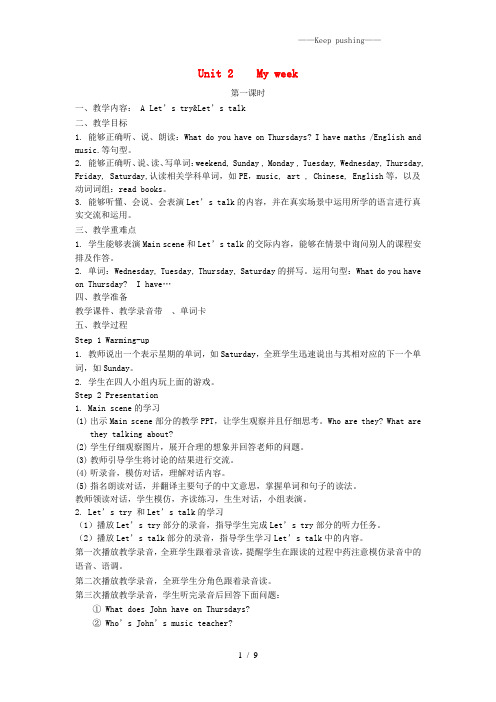
Unit 2 My week第一课时一、教学内容: A Let’s try&Let’s talk二、教学目标1. 能够正确听、说、朗读:What do you have on Thursdays? I have maths /English and music.等句型。
2. 能够正确听、说、读、写单词:weekend, Sunday , Monday , Tuesday, Wednesday, Thursday, Friday, Saturday,认读相关学科单词,如PE,music, art , Chinese, English等,以及动词词组:read books。
3. 能够听懂、会说、会表演Let’s talk的内容,并在真实场景中运用所学的语言进行真实交流和运用。
三、教学重难点1. 学生能够表演Main scene和Let’s talk的交际内容,能够在情景中询问别人的课程安排及作答。
2. 单词:Wednesday, Tuesday, Thursday, Saturday的拼写。
运用句型:What do you have on Thursday? I have…四、教学准备教学课件、教学录音带、单词卡五、教学过程Step 1 Warming-up1. 教师说出一个表示星期的单词,如Saturday,全班学生迅速说出与其相对应的下一个单词,如Sunday。
2. 学生在四人小组内玩上面的游戏。
Step 2 Presentation1. Main scene的学习(1)出示Main scene部分的教学PPT,让学生观察并且仔细思考。
Who are they? What arethey talking about?(2)学生仔细观察图片,展开合理的想象并回答老师的问题。
(3)教师引导学生将讨论的结果进行交流。
(4)听录音,模仿对话,理解对话内容。
(5)指名朗读对话,并翻译主要句子的中文意思,掌握单词和句子的读法。
六年级英语上册课文翻译完整版

Wu Binbin: Robin, where is the museum shop? I want to buy a postcard.吴彬彬:罗宾,博物馆的商店在哪儿?我想要买一张明信片。
Robin: It’s near the door.罗宾:在大门附近。
Wu Binbin: Thanks. Where is the post office? I want to send it today.吴彬彬:谢谢。
邮局在哪儿?我想要今天把它寄出去。
Robin: I don’t know. I’ll ask. Excuse me, sir.罗宾:我不知道。
我要去问一下。
打扰一下,先生。
Man: Wow! A talking robot! What a great museum!男人:哇!一个说话的机器人!多棒的一个博物馆啊!Robin: Where is the post office?罗宾:邮局在哪儿?Man: It’s next to the museum.男人:挨着博物馆。
Robin: Thanks.罗宾:谢谢。
Mike: What an interesting film!迈克:多么有趣的电影啊!Wu Binbin: Yes, but I’m hungry now. I know a great Italian restaurant.吴彬彬:是的,但是我现在饿了。
我知道一家很棒的意大利餐馆。
Mike: Yum! I like pizza! Where is the restaurant?迈克:好呀!我喜欢比萨饼!餐馆在哪儿?Wu Binbin: It’s next to the park on Dongfang Street.吴彬彬:在东方大街上,挨着公园。
Mike: How can we get there?迈克:我们怎么到那儿?Robin: Turn left at the bookstore. Then turn right at the hospital.罗宾:到书店左转,然后到医院右转。
初二英语上册Unit 2课文翻译及知识点汇总
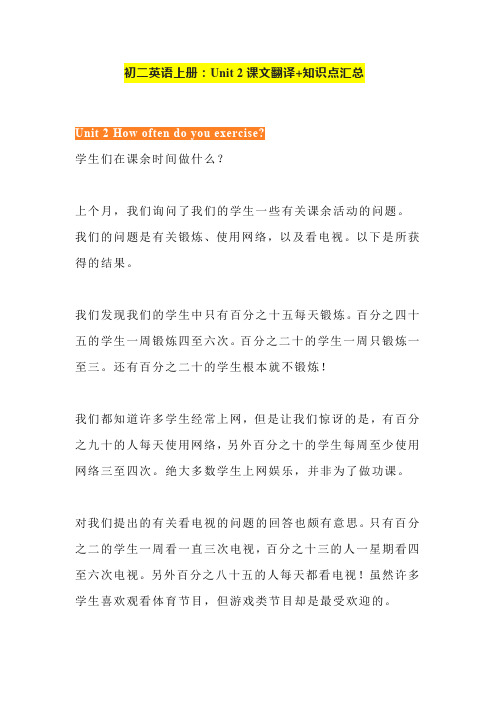
初二英语上册:Unit 2课文翻译+知识点汇总学生们在课余时间做什么?上个月,我们询问了我们的学生一些有关课余活动的问题。
我们的问题是有关锻炼、使用网络,以及看电视。
以下是所获得的结果。
我们发现我们的学生中只有百分之十五每天锻炼。
百分之四十五的学生一周锻炼四至六次。
百分之二十的学生一周只锻炼一至三。
还有百分之二十的学生根本就不锻炼!我们都知道许多学生经常上网,但是让我们惊讶的是,有百分之九十的人每天使用网络,另外百分之十的学生每周至少使用网络三至四次。
绝大多数学生上网娱乐,并非为了做功课。
对我们提出的有关看电视的问题的回答也颇有意思。
只有百分之二的学生一周看一直三次电视,百分之十三的人一星期看四至六次电视。
另外百分之八十五的人每天都看电视!虽然许多学生喜欢观看体育节目,但游戏类节目却是最受欢迎的。
通过使用网络或观看游戏类节目来放松是件好事,但我们认为最佳的放松方式是通过锻炼。
它有益于身心的健康。
诸如参加体育运动这样的锻炼方式不但有趣,而且当你和朋友、家人一起运动时,你们还可以共度时光。
请记住:”旧习难改。
”所以赶快锻炼起来,不要等到来不及了。
【重点语法】1. 频率副词:always, usually, often, sometimes, never频率副词在句中通常放在实义动词之前, be动词或助动词之后。
常用于一般现在时态中。
2.“次数”的表达方法一次once,两次twice,三次或三次以上:基数词+ times, 如:three times, five times3. how often“多久一次”问频率,回答常含有频率词组或短语。
常见的how疑问词:1)How soon 多久(以后)—How soon will he be back?他多久能回来?—He will be back in a month. 他一个月后能回来。
2)how long “多久”—How long did it take you to clean the house? 你打扫房子用了多久?—It took me half an hour to clean the house. 我打扫这房子用了半小时。
外研版小学英语四年级下册课文翻译

星期三我将去公园。
On Thursday I'll do my homework.
星期四我将做作业。
On Friday I'llvisit my grandma.
星期五我会去看我奶奶。
On Saturday I'II help my mother.
On Saturday we're going to have a picnic!
星期六我们要去野餐!太好了!
Will you take your kite
tomorrow?No,I
明天你要带风筝吗?不,我不会。
Oh.Will you takeyour ball tomorrow?No,I
哦,明天你会带球去吗?不,我不会。
They are old.They weren't old then.
他们很老。那时他们不老。
They were young.
他们很年轻。
She is tall.She wasn't tall then.She was
她很咼。那时她不咼。她很矮。
It is clean」t wasn't clean then.lt was
这是白金汉宫,
It's very big and very beautiful.
它非常大,非常漂亮。
Yes it is!
是的,它是!
Is it your house? NO,it isn't.
这是你的房子?不,它不是。
Whose house is it ? It's the Queen's
My Days of the Week课文翻译
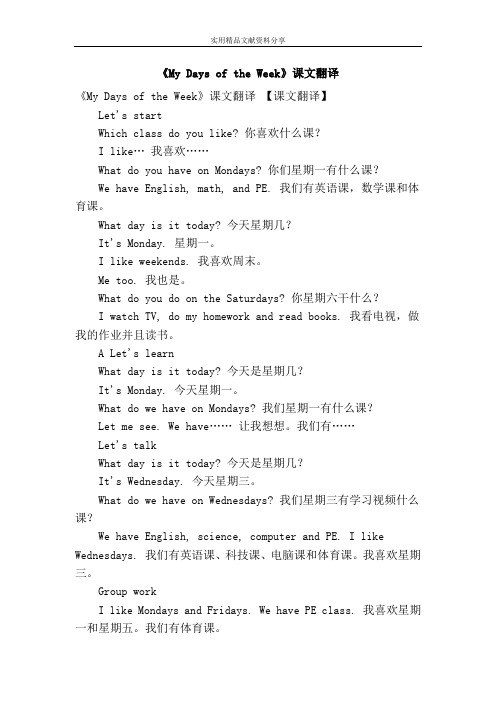
《My Days of the Week》课文翻译《My Days of the Week》课文翻译【课文翻译】Let's startWhich class do you like? 你喜欢什么课?I like… 我喜欢……What do you have on Mondays? 你们星期一有什么课?We have English, math, and PE. 我们有英语课,数学课和体育课。
What day is it today? 今天星期几?It's Monday. 星期一。
I like weekends. 我喜欢周末。
Me too. 我也是。
What do you do on the Saturdays? 你星期六干什么?I watch TV, do my homework and read books. 我看电视,做我的作业并且读书。
A Let's learnWhat day is it today? 今天是星期几?It's Monday. 今天星期一。
What do we have on Mondays? 我们星期一有什么课?Let me see. We have…… 让我想想。
我们有……Let's talkWhat day is it today? 今天是星期几?It's Wednesday. 今天星期三。
What do we have on Wednesdays? 我们星期三有学习视频什么课?We have English, science, computer and PE. I like Wednesdays. 我们有英语课、科技课、电脑课和体育课。
我喜欢星期三。
Group workI like Mondays and Fridays. We have PE class. 我喜欢星期一和星期五。
我们有体育课。
I like Tuesdays and Thursdays. We have art class. 我喜欢星期二和星期四。
译林版英语小学四年级下册--课文翻译(英汉对照)
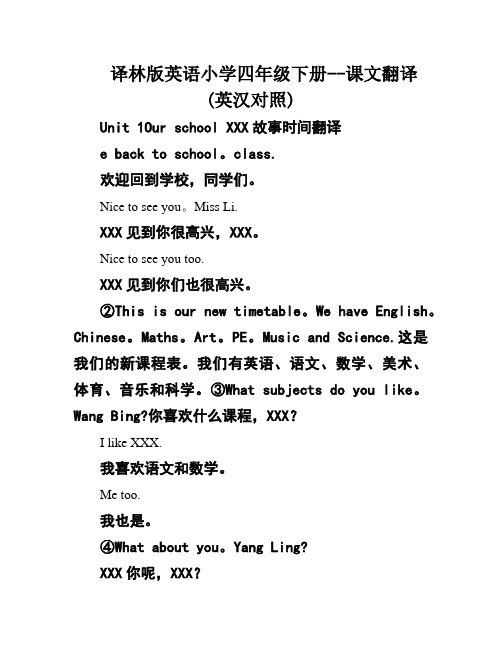
译林版英语小学四年级下册--课文翻译(英汉对照)Unit 1Our school XXX故事时间翻译e back to school。
class.欢迎回到学校,同学们。
Nice to see you。
Miss Li.XXX见到你很高兴,XXX。
Nice to see you too.XXX见到你们也很高兴。
②This is our new timetable。
We have English。
Chinese。
Maths。
Art。
PE。
Music and Science.这是我们的新课程表。
我们有英语、语文、数学、美术、体育、音乐和科学。
③What subjects do you like。
Wang Bing?你喜欢什么课程,XXX?I like XXX.我喜欢语文和数学。
Me too.我也是。
④What about you。
Yang Ling?XXX你呢,XXX?I like English。
It's fun.我喜爱英语。
它很风趣。
⑤Oh。
It's time for PE.哦!到上体育课的时间了。
Let's go to the playground.让我们去操场吧。
Unit 1 Cartoon time英语课文翻译①Hi。
Billy。
What lessons do we have this morning?你好,XXX。
今天上午我们有什么课?Hi。
Bobby。
It's Monday。
We have Music and Maths。
I like Music.译林版英语小学四年级下册--课文翻译(英汉比较)你好,XXX。
本日是礼拜一。
我们有音乐和数学。
我喜爱音乐。
②What lessons do we have this afternoon。
Sam?本日下战书我们有甚么课,XXX?We have PE and Science。
I like PE。
It's fun.我们有体育和科学。
新概念第一册课文翻译及知识点【Lesson67、69、71】

【导语】新概念英语作为⼀套世界闻名的英语教程,以其全新的教学理念,有趣的课⽂内容和全⾯的技能训练,深受⼴⼤英语学习者的欢迎和喜爱。
为了⽅便同学们的学习,⽆忧考为⼤家整理了⾯的新概念第⼀册课⽂翻译及学习笔记,希望为⼤家的新概念英语学习提供帮助!Lesson67 【课⽂】 MRS.JOHNSON: Hello. Were you at the butcher's? MRS.WILLIAMS:Yes. I was. Were you at butcher's, too? MRS.JOHNSON: No, I wasn't. I was at the greengrocer's. How's Jimmy today? MRS.WILLIAMS:He's very well, thank you. MRS.JOHNSON: Was he absent from school last week? MRS.WILLIAMS:Yes, he was. He was absent on Monday, Tuesday, Wednesday and Thursday. How are you all keeping? MRS.JOHNSON: Very well, thank you. We're going to spend three days in the country. We're going to stay at my mother's for the weekend. MRS.WILLIAMS:Friday, Saturday and Sunday in the country! Aren't you lucky! 【课⽂翻译】 约翰逊夫⼈:您好。
刚才您在⾁店⾥吗? 威廉斯夫⼈:是的,我在⾁店⾥。
您也在⾁店⾥吗? 约翰逊夫⼈:不,我不是。
五年级英语:《My Days of the Week》课文翻译

小学英语新课程标准教材英语教案( 2019 — 2020学年度第二学期 )学校:年级:任课教师:英语教案 / 小学英语 / 小学五年级英语教案编订:XX文讯教育机构《My Days of the Week》课文翻译教材简介:本教材主要用途为通过学习英语的内容,提高学生的语言技能,增加一项语言能力,有利于国际化的日常交流、生活、工作等,本教学设计资料适用于小学五年级英语科目, 学习后学生能得到全面的发展和提高。
本内容是按照教材的内容进行的编写,可以放心修改调整或直接进行教学使用。
《my days of the week》课文翻译【课文翻译】let's startwhich class do you like? 你喜欢什么课?i like…我喜欢……what do you have on mondays? 你们星期一有什么课?we have english, math, and pe. 我们有英语课,数学课和体育课。
what day is it today? 今天星期几?it's monday. 星期一。
i like weekends. 我喜欢周末。
me too. 我也是。
what do you do on the saturdays? 你星期六干什么?i watch tv, do my homework and read books. 我看电视,做我的作业并且读书。
a let's learnwhat day is it today? 今天是星期几?it's monday. 今天星期一。
what do we have on mondays? 我们星期一有什么课?let me see. we have……让我想想。
我们有……let's talkwhat day is it today? 今天是星期几?it's wednesday. 今天星期三。
what do we have on wednesdays? 我们星期三有学习视频什么课?we have english, science, computer and pe. i like wednesdays. 我们有英语课、科技课、电脑课和体育课。
小学英语_My Week教学设计学情分析教材分析课后反思
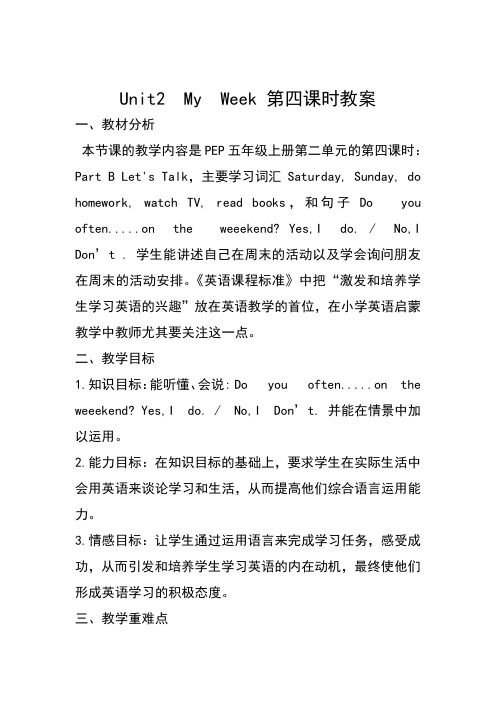
Unit2 My Week 第四课时教案一、教材分析本节课的教学内容是PEP五年级上册第二单元的第四课时:Part B Let's Talk,主要学习词汇Saturday, Sunday, do homework, watch TV, read books,和句子Do you often.....on the weeekend? Yes,I do. / No,I Don’t . 学生能讲述自己在周末的活动以及学会询问朋友在周末的活动安排。
《英语课程标准》中把“激发和培养学生学习英语的兴趣”放在英语教学的首位,在小学英语启蒙教学中教师尤其要关注这一点。
二、教学目标1.知识目标:能听懂、会说: Do you often.....on the weeekend? Yes,I do. / No,I Don’t. 并能在情景中加以运用。
2.能力目标:在知识目标的基础上,要求学生在实际生活中会用英语来谈论学习和生活,从而提高他们综合语言运用能力。
3.情感目标:让学生通过运用语言来完成学习任务,感受成功,从而引发和培养学生学习英语的内在动机,最终使他们形成英语学习的积极态度。
三、教学重难点本课时的重点是掌握句型:Do you often.....on the weeekend? Yes,I do. / No,I Don’t 并能在真实情景中运用。
四.教具准备PPT课件,小星星,彩色粉笔。
五.教学过程(一)Warm-up1.Free talk2.Let’s sing(二)Presentation1.教师问:What do you often do on the weekend?I often go shopping. What about you?然后出示5幅图画,用句型:I often.......来回答。
2.教师问:Do you often.....on the weeekend?,进而出示图片让学生在小组内进行问答练习,上台演示。
五年级英语上册第2单元课文内容翻译
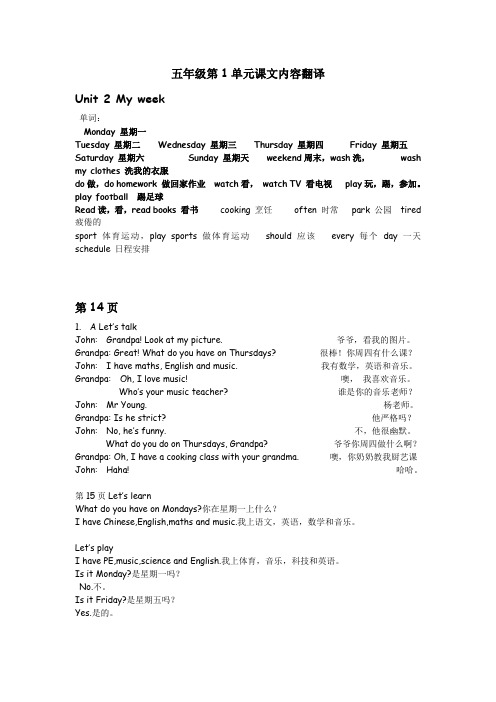
五年级第1单元课文内容翻译Unit 2 My week单词:Monday 星期一Tuesday 星期二 Wednesday 星期三 Thursday 星期四 Friday 星期五Saturday 星期六 Sunday 星期天 weekend周末,wash洗, wash my clothes 洗我的衣服do做,do homework 做回家作业 watch看, watch TV 看电视 play玩,踢,参加。
play football踢足球Read读,看,read books 看书cooking 烹饪often 时常park 公园tired 疲倦的sport体育运动,play sports做体育运动should 应该every 每个day 一天schedule 日程安排第14页1. A Let’s talkJohn: Grandpa! Look at my picture. 爷爷,看我的图片。
Grandpa: Great! What do you have on Thursdays? 很棒!你周四有什么课?John: I have maths, English and music. 我有数学,英语和音乐。
Grandpa: Oh, I love music! 噢,我喜欢音乐。
Who’s your music teacher? 谁是你的音乐老师?John: Mr Young. 杨老师。
Grandpa: Is he strict? 他严格吗?John: No, he’s funny. 不,他很幽默。
What do you do on Thursdays, Grandpa? 爷爷你周四做什么啊?Grandpa: Oh, I have a cooking class with your grandma. 噢,你奶奶教我厨艺课John: Haha! 哈哈。
第15页Let’s learnWhat do you have on Mondays?你在星期一上什么?I have Chinese,English,maths and music.我上语文,英语,数学和音乐。
小学英语五年级上册Unit2My week我的一周释义
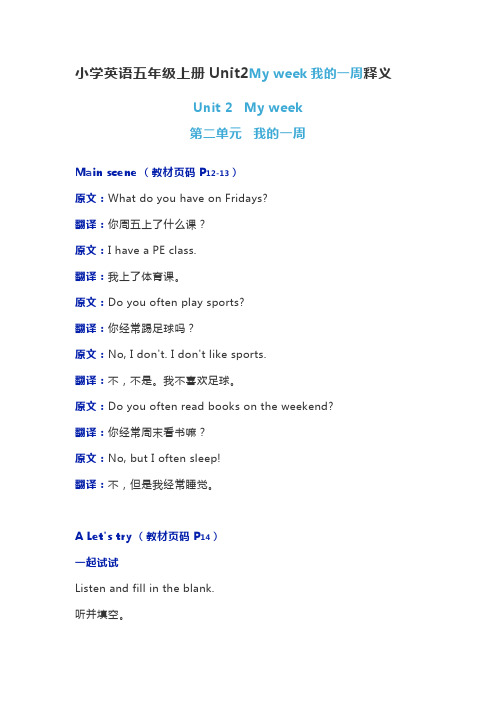
小学英语五年级上册Unit2My week我的一周释义Unit 2 My week第二单元我的一周Main scene (教材页码P12-13)原文:What do you have on Fridays?翻译:你周五上了什么课?原文:I have a PE class.翻译:我上了体育课。
原文:Do you often play sports?翻译:你经常踢足球吗?原文:No, I don't. I don't like sports.翻译:不,不是。
我不喜欢足球。
原文:Do you often read books on the weekend?翻译:你经常周末看书嘛?原文:No, but I often sleep!翻译:不,但是我经常睡觉。
A Let's try (教材页码P14)一起试试Listen and fill in the blank.听并填空。
原文:Good morning, John. What day is it today? 翻译:早上好,乔恩。
今天是星期几?原文:Wednesday.翻译:星期三。
原文:Oh, yes. What do you have on Wednesdays? 翻译:哦,这样。
你星期三有什么课?原文:I have art. I really like it.翻译:我有美术课。
我非常喜欢。
A Let's talk (教材页码P14)一起说吧原文:Grandpa! Look at my picture.翻译:祖父!看看我的照片!原文:Great! What do you have on Thursdays?翻译:太棒了!你周四上什么课?原文:I have maths, English and music.翻译:数学、英语和音乐。
原文:Oh, I love music! Who's your music teacher? 翻译:哦,我爱音乐!谁是你音乐老师?原文:Mr Young.翻译:杨先生。
week2 单词翻译
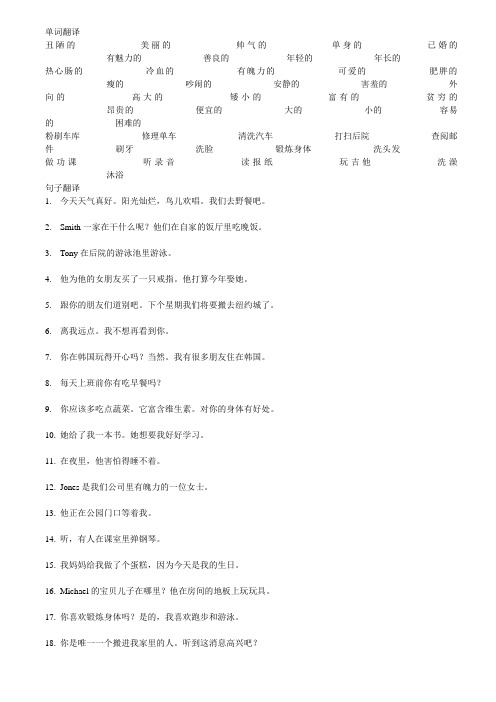
单词翻译丑陋的_____________ 美丽的_____________ 帅气的_____________ 单身的_____________ 已婚的_____________ 有魅力的_____________ 善良的_____________年轻的_____________ 年长的_____________ 热心肠的_____________ 冷血的_____________ 有魄力的_____________ 可爱的_____________ 肥胖的_____________ 瘦的_____________ 吵闹的_____________ 安静的_____________ 害羞的_____________ 外向的_____________ 高大的_____________ 矮小的_____________ 富有的_____________ 贫穷的_____________ 昂贵的_____________ 便宜的_____________ 大的_____________ 小的_____________容易的_____________ 困难的_____________粉刷车库_____________ 修理单车_____________ 清洗汽车_____________ 打扫后院_____________ 查阅邮件_____________ 刷牙_____________ 洗脸_____________ 锻炼身体_____________ 洗头发_____________ 做功课_____________ 听录音_____________ 读报纸_____________ 玩吉他_____________ 洗澡_____________ 沐浴_____________句子翻译1.今天天气真好。
阳光灿烂,鸟儿欢唱。
我们去野餐吧。
______________________________________________________________________________________________ 2.Smith一家在干什么呢?他们在自家的饭厅里吃晚饭。
《MyDaysoftheWeek》课文翻译
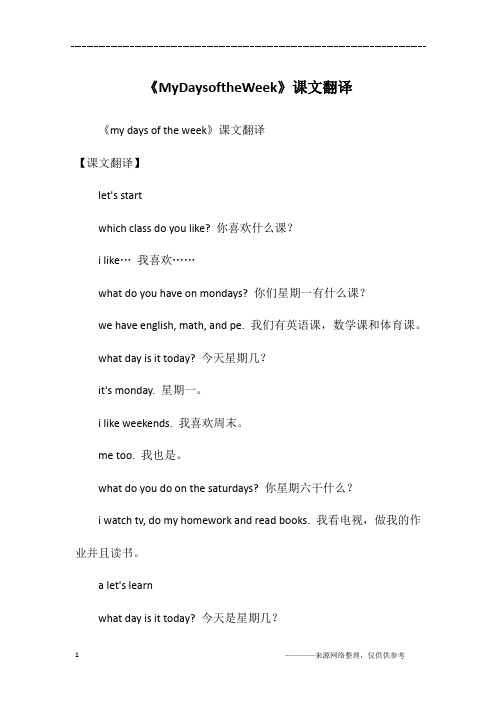
《MyDaysoftheWeek》课文翻译《my days of the week》课文翻译【课文翻译】let's startwhich class do you like? 你喜欢什么课?i like…我喜欢……what do you have on mondays? 你们星期一有什么课?we have english, math, and pe. 我们有英语课,数学课和体育课。
what day is it today? 今天星期几?it's monday. 星期一。
i like weekends. 我喜欢周末。
me too. 我也是。
what do you do on the saturdays? 你星期六干什么?i watch tv, do my homework and read books. 我看电视,做我的作业并且读书。
a let's learnwhat day is it today? 今天是星期几?it's monday. 今天星期一。
what do we have on mondays? 我们星期一有什么课?let me see. we have……让我想想。
我们有……let's talkwhat day is it today? 今天是星期几?it's wednesday. 今天星期三。
what do we have on wednesdays? 我们星期三有学习视频什么课?we have english, science, computer and pe. i like wednesdays. 我们有英语课、科技课、电脑课和体育课。
我喜欢星期三。
group worki like mondays and fridays. we have pe class. 我喜欢星期一和星期五。
我们有体育课。
i like tuesdays and thursdays. we have art class. 我喜欢星期二和星期四。
六年级英语上册素材-Unit3 Sports课文翻译 北师大版(三起)

Unit3 Sports第三单元运动Get Ready课前准备Last Week's Sports Day上周的运动会1. Look and Match看一看,连一连2. Talk about the First Picture说说第一张图片Who was first in the race?谁在赛跑中得了第一名?Mike was first.迈克第一名。
Lesson 1 Enjoy the Story第一课欣赏故事School Sports Day学校的运动日Yesterday was the School Sports Day.昨天是学校的运动日。
Ken ran in the 200-meter race.肯参加了200米赛跑。
I'm going to run in the 200-meter race.我将要参加200米赛跑。
Ready! Set! Go!准备好了!预备!跑!David ran very fast.大卫跑得很快。
He was first and he won the race.他冲在第一个,赢得了这场比赛。
Come on! Ken! Run!加油!肯!快跑!Ken was second.肯得了第二。
John came third.约翰第三。
Ann ran in the 100-meter race.安参加了100米赛跑。
Mocky was very excited.莫奇非常兴奋。
Did Ken win the race?肯赢了比赛吗?No, Mocky, he didn't.不,莫奇,肯没有。
He was second.他第二名。
Come on! Ann! Run!加油!安!快跑!Jane was first,简第一,and Mary was second.玛丽第二。
Ann came last.安在最后。
Did Ann win the race?安赢得比赛了吗?No, Mocky. She didn't.不,莫奇,她没有。
- 1、下载文档前请自行甄别文档内容的完整性,平台不提供额外的编辑、内容补充、找答案等附加服务。
- 2、"仅部分预览"的文档,不可在线预览部分如存在完整性等问题,可反馈申请退款(可完整预览的文档不适用该条件!)。
- 3、如文档侵犯您的权益,请联系客服反馈,我们会尽快为您处理(人工客服工作时间:9:00-18:30)。
• 在Life is a journey一句中,life是本体;journey为喻体。按照 说话人和听话人的经验,喻体journey的联想意义可大致定为三 点:1·有始有终;2·有乐趣也有困难;3·最终达到目的地。这 三个联想意义投射到本体life上,使其获得相应的三个意义:1· 有开端有终结;2·有苦有乐,有悲有喜;3·具有目的性。由此得 出的隐喻意义是:人生是一个有始有终,有苦有乐,有悲有喜,具 有目的性的自然过程。
• run on V to continue without interruption
• run on a better schedule than others:更符合(死亡)时间
表的安排。该时间表存在于人间习俗之中,与宿命论中的“天 意”、“上天的安排”没有关系。
• 译文:如果“早逝”另有所指的话,那一定是人们相信,有些 人死得更合“时宜”,而另一些人则“死不逢时”。
业鼎盛时期而死的人。
• whose lives seemed equally brief and complete:此句为
MariLyn Monroe and James Deans的定语从句,翻译时可采用 分译法,即“此二人生命虽短,却依然完美无缺。” • 在诸多杰出的“英年早逝者”当中,我们不会忘记玛丽莲·梦 露与詹姆斯·迪恩斯。此二人生命虽短,却依然完美无缺。
Байду номын сангаас
• The idea that the life cut short is unfulfilled is illogical because lives are measured by the impressions they leave on the world and by their intensity and virtue.
• Death in old age is rarely called untimely—a long life is thought to be a full one. But with the passing of a young person, one assumes that the best years lay ahead and the measure of that life was still to be taken. History denies this, of course.
这又是一个关于同位语翻译的句子,可以在the fact 前面加上“这个”、
“这座”等词语,即“约翰·济慈年方26便溘然长逝这一事实”;另外, 这个句子蕴涵的内容比较丰富,不可以用简单的一句话表达清楚,因此要 用增词法,即调整句子结构,补充隐含的内容,可翻译为“诗人约翰·济 慈26岁与世长辞,众多作家难以接受,半开玩笑地说,他们自己的生命即 便超过26岁,也不过失败二字。”
• That theory doesn’t hold water.
• 此句中“hold water”为动词性隐喻,其引伸意为“be capable of standing up the examination or testing”(经得起验证)。 • “那个理论站不住脚” 。
• 在英汉修辞比较中,隐喻的作用与特征大致相同,所以 一般情况下,在翻译隐喻时,也可采用直译法。
• a full one:圆满的一生。 • the best years lay ahead:根据上下文可以译为“才华尚未施展”。 • the measure of that life was still to be taken:意为生命价值有待
估量,可翻译为“前途无可限量”。
• 年迈去世很少被称作“早逝”,因为长寿就是圆满。反之,如果是年轻 人谢世,人们会认为这位年轻人才华尚未施展,前途无可限量。
• Among prominent summer deaths, one recalls those of MariLyn Monroe and James Deans, whose lives seemed equally brief and complete.
• Someone who is prominent is important and well-known. • summer deaths:英年谢世者;在风华正茂时死去的人;在事
• The world is an unweeded garden, That grows to seed…( W. Shakespeare Hamelet)
• 世间是一个荒芜不堪的花园,到处荆棘丛生……(莎士比亚《哈 姆雷特》)
• Jane’s uncle is an old fox, up to all kind of evils.
• 他着魔似的驾车狂奔。
• 烂醉如泥 • 挥金入土
• He drove as if possessed by the devil.
• As drunk as a lord
• To spend money like water
• 湿的象落汤鸡 • 雨后春笋
• As wet as a drowned rat • To spring up like mushroom
修辞格在英汉翻译中的应用
请在此输入您的副标题
Outline
1. Homework
2.修辞格在英汉翻译中的应用 3. Assignment
Homework
• If people mean anything at all by the expression “untimely death”, they must believe that some deaths run on a better schedule than others. Death in old age is rarely called untimely—a long life is thought to be a full one. But with the passing of a young person, one assumes that the best years lay ahead and the measure of that life was still to be taken. History denies this, of course. Among prominent summer deaths, one recalls those of MariLyn Monroe and James Deans, whose lives seemed equally brief and complete. Writers cannot bear the fact that poet John Keats died at 26, and only half playfully judge their own lives as failures when they pass that year. The idea that the life cut short is unfulfilled is illogical because lives are measured by the impressions they leave on the world and by their intensity and virtue.
• While we cannot close the gulf between us, we can try to bridge it so that we may be able to talk across it.
尽管我们不能填平我们之间的鸿沟,我们却可以设法架一座桥, 以便跨过这座桥来进行交谈。
• (1) Misfortunes never come single.
• 祸不单行。
• (2) Dawn was beginning to prowl about the sky and put out the stars.
• 黎明悄悄来临,星星暗淡无光。
• (3)风呼啸着穿过树林。 • The wind whistled through the trees.
隐喻
• 其基本特征可从英语的等同词metaphor的构成中体现出来。 Metaphor一词源于希腊语“metaphere”, “meta”意为“从一 边到另一边”,“phere”的意思是“传达、传送”,二者合一意 为用一个事物来表达另一事物,是一种“由此及彼”的运动,一 种转换。换言之,隐喻涉及两种事物,一个是出发点,另一个为目 的地。汉语有“喻体”与“本体”。一个完整的隐喻往往由“ 本体”和“喻体”两项构成,两个概念互相作用,激活日常观念 联想系统。喻体的某个特征,或称联想意义被投射到本体上,即 形成隐喻意义,隐喻意义在两者相互作用的过程中创造出来。
• If people mean anything at all by the expression “untimely death”, they must believe that some deaths run on a better schedule than others. • Untimely ADJ If you describe an event as untimely, you mean that it happened earlier than it should, or sooner than you expected. • E.g. His mother's untimely death had a catastrophic effect on him. • untimely death:早逝;早死;过早的死去。
Writers cannot bear the fact that poet John Keats died at 26, and 请在此输入您的标题
only half playfully judge their own lives as failures when they
